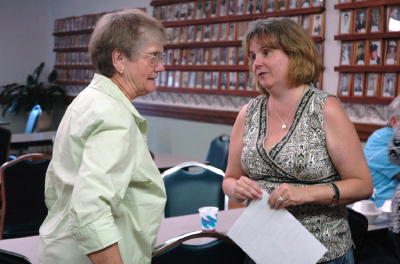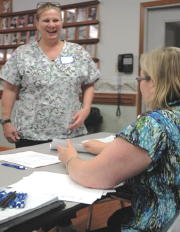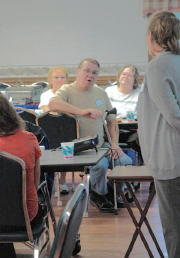GENOME PROJECT COMING TO COUNTY - Documenting Family Health History, Preventing Chronic Health Problems

Participants in the community forum, Peggy Stemple (left)
and Donna Steigleder discussing family health history
after the open discussion (Photo by Liesl Crowder)
Nestled deep in the rolling hills of West Virginia are some of the most unique communities. What makes them so unique is everyone knows one another. They are connected by the bonds that were created by generations.
Everyone in the community has a story to tell and these stories are a key element to Dr. Taura Barr's research and the use of genomic medicine through discussions of family health history.
Dr. Barr is hoping to grasp onto these stories to emphasize the importance of collecting family health history to identify risk for common diseases that run through the blood line of families.
'Individuals can use their family health history to tailor their behavior change plans and to educate other family members and friends on what has worked and what has not,' states Dr. Barr.
Dr. Barr is working in conjunction with the West Virginia Prevention Research Center (PRC) and their Community Partnership Board (CPB) members as well as community health centers and liaisons in Calhoun, Fayette and McDowell counties.
Throughout the past year Dr. Barr and her team have traveled to local communities to partner with community members to collect family health stories and educate communities on the importance of using these stories to understand risk for disease and how, together, we can prevent these diseases.
The first community the team traveled to was Calhoun County, where Barb McKown and Tony Richards, CPB members, have used their connections with the Minnie Hamilton Health System to generate interest in the GENOME Community Project.
McKown is the Community Outreach Coordinator for the Minnie Hamilton Heath System and Richards is the Program Specialist at the American Lung Association West Virginia. Together, they have helped us to promote Genomic education and disease prevention in Calhoun County.
The GENOME Community Project, which stands for Genomic Education in Our home and community, consists of three phases.
The first phase of the project was completed through community discussions to begin the conversation of family health stories with local community members to first, educate them on what genomics is, and secondly to get an idea from the community of what they want and need from their healthcare providers, and gain what they would like to see out of this partnership with us.
The first forum was held at the Calhoun County Committee on Aging where the team met with community members to get specific information on what the people of Calhoun County understood about Genomics. Geri Dino, director of the Prevention Research Center states, 'This is very much a partnership between WVU and the communities we serve.'
 Community member, Jony Harding (standing) speaks with
WV Prevention Research Center Managing Director, Leesa Prendergast (seated).
Community member, Jony Harding (standing) speaks with
WV Prevention Research Center Managing Director, Leesa Prendergast (seated).
The second phase of this project is to increase awareness of family health history as a tool to identify risk for chronic disease. This phase requires a lot of input from practitioners and clinicians and will include discussions with the community members to discuss prevention methods and using family health stories to motivate positive lifestyle changes.
To complete this phase we are holding focus group meetings with community members and conferences with clinicians and offering continuing education credits for health practitioners.
During these conferences clinicians will be asked to use the Surgeon Generals Family Health History Tools in their practice and evaluate the tools feasibility in rural settings.
'After the clinicians use the tool for a couple of months, the project team will go back and re-evaluate the tool, whether or not they liked it and how we can change it to better suit their needs,' states Barr.
By collecting family health history, the community can use it as a tool to prevent chronic diseases form passing down to future generations. 'Documenting family health history is critical to curbing our detrimental health spiral in West Virginia,' says Tony Richards, a community partnership board member.
 Janet Poling, Bill Cunningham and JoAnn Straub interacting with Taura Barr, head of the GENOME Community project during open forum discussion (Photo by Liesl Crowder
Janet Poling, Bill Cunningham and JoAnn Straub interacting with Taura Barr, head of the GENOME Community project during open forum discussion (Photo by Liesl Crowder
The third phase of the project is more of a full scale, statewide program. The third phase will include training health practitioners and clinicians on how to conduct and collect family health history. Barr states her team wants to develop a meaningful connection between patients and their health providers.
'This phase consists of training community members to collect information on family health history and current behaviors to create a program where community members can work with each other and their health care providers to develop plans to assist in lifestyle change, that are specific to each person,' explains Barr.
'We hope to develop a new way of collecting family history, to improve development of rural populations to make family health history relevant to them; family health stories are a much more meaningful way to capture health history,' states Barr.
The West Virginia University Prevention Research Center, Community Partnership Board members and Dr. Barr know that with the help of the community members and health practitioners, we will find ways to empower communities to take charge of their health for themselves and for future generations of West Virginians.